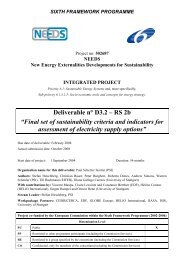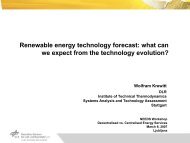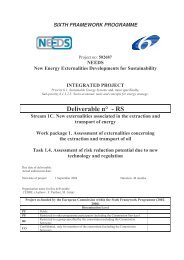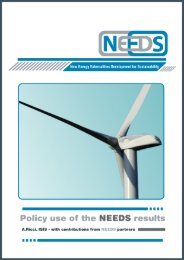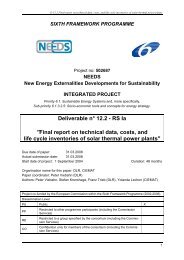Generation, of the energy carrier HYDROGEN In context ... - needs
Generation, of the energy carrier HYDROGEN In context ... - needs
Generation, of the energy carrier HYDROGEN In context ... - needs
You also want an ePaper? Increase the reach of your titles
YUMPU automatically turns print PDFs into web optimized ePapers that Google loves.
NyOrka Page 39 12/18/20084.5.2 <strong>In</strong>tegrated systemsThe efficiency <strong>of</strong> an <strong>energy</strong> chain that starts with renewable <strong>energy</strong> and ends withhydrogen for use in various applications may never be able to compete with <strong>the</strong>infrastructure and well to tank efficiency provided in <strong>the</strong> carbon era. Yet <strong>the</strong> source forrenewable <strong>energy</strong> is said endless and <strong>the</strong> water becomes recyclable. The efficiencycriteria do not prevent <strong>the</strong> use <strong>of</strong> <strong>the</strong> unlimited sources. Some <strong>of</strong> <strong>the</strong> most advancedstudies in integrated, diversified and flexible systems are currently undertaken in Japanwhere research has been looking into raising efficiency in integrated systems not only inseparate components. The cleanliness and <strong>the</strong> flexibility <strong>of</strong> using hydrogen is considereda driver because <strong>of</strong> added customer value and new opportunities for <strong>the</strong> Japaneseindustry 46 .Figure 19 A hydrogen test system that is intended to monitor and raise total <strong>energy</strong> efficiency.5 Technology development perspectivesHydrogen storage and transportation, system efficiency as well as material developmentare <strong>the</strong> most important points for hydrogen technology development. The electrolyserswill go through high pressure to high heat and pressure electrolysers but in <strong>the</strong> far futureelectrolysers are foreseen to merge with fuel cells.Transportation <strong>of</strong> hydrogen is bound to be ineffective in small amounts, especially in <strong>the</strong>gaseous phase. Liquefaction decreases efficiency by 10 – 15%. Transferring electricity islikely to interact with distribution <strong>of</strong> hydrogen and vice versa. Kozawa et al have46 OKAMOTO Hideyuki, Yoshiaki KAWAKAMIP, Yoshiyuki KOZAWA, Makoto AKAIP P Total Energy SystemEngineering by Coring Metal Hydride Tanks



